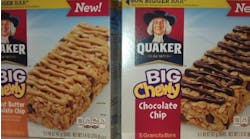For most of the presenting companies, the unofficial theme at this year's Consumer Analyst Group of New York Conference was the same as last year's: returning to topline growth. One key difference: This year, a few apparently have found the answer, or answers.
Topline growth was the common utterance of most of the 13 CEOs of major, publicly held food and beverage companies, who were "selling" their companies to the financial analysts at the annual February conference. And while "customer-centric" and zero-based budgeting phrases still were heard, there were fewer mentions of headwinds, advantaged portfolios and virtuous circles, three favorites of past years.
And there was one very new presenter this year. Bruce Linton, the founder, chairman and CEO of Canopy Growth Corp., arguably the leader in developing cannabis products in the newly legal Canadian market, also spoke. For his session, the huge meeting room was packed.
Among the mainstream food and beverage companies, it's notable that many recorded one-year bumps last year in net income, some quite sizable, due to the new corporate tax laws.
Although it may not appear so at first glance, the first two food companies to speak had a lot in common. Both General Mills and Mondelez suffered through sales declines every year from 2014 through 2017. Both also saw the slightest uptick last year, sales increases of less than 1 percent, and both also promise they are turning things around and already see proof of that.
But there's one key difference. Mondelez attributes its years of decline to headwinds in what most consider the attractive developing markets. Ironically, 2018 sales in Latin America and Eastern Europe/Middle East/Africa declined – to some extent, due to unfavorable exchange rates – while those in the mature North American and Western European markets grew. Otherwise, the company is well-positioned to succeed because it's global and it's overwhelmingly committed to snacking. And the whole world is snacking more, right?
General Mills, on the other hand, knows it has to undertake a major makeover. Brands and product lines like Pillsbury, Big G cereals and Betty Crocker have lost their relevance (and sales). Yoplait is struggling in a crowded and flat yogurt category. North America retail sales in general are suffering – although Häagen-Dazs and Old El Paso are doing well.
The solutions were transformational acquisitions like Annie's Homegrown in 2014 and Blue Buffalo Pet Products Inc. last year. $800 million seemed like a lot to pay for Annies, but it's chump change compared to the $8 billion pricetag for Blue Buffalo.
Kellogg, the first presenter for day two, is showing signs of recovery. "A year ago [his first presentation to CAGNY] I told you our first priority after the cost reductions was to restore topline growth," said CEO Steve Cahillane. "It's never easy to reverse multiple years of sales declines."
This was the first CAGNY for Steve Oakland, who has been CEO of TreeHouse Foods for just 11 months. He's also only the second CEO in the history of the company, which was molded by the strong personality of founder Sam Reed. Sales shrank in 2017 and 2018, something he seems comfortable with as he reshapes the company by selling product lines, not buying as TreeHouse was famous for doing, and closing plants.
"Lift, shift and scale" is new philosophy at Coca Cola Co. under relatively new CEO James Quincey. Coke has had a great run with carbonated soft drinks in the developed world, but Quincey is aiming at "80 percent of the world [that] is developing and emerging markets," as well as new drinks – like last year's acquisition of Costa Coffee. While Costa was mostly a Starbucks-like chain of European coffee shops, Coke sees it as a global brand for hot and cold packaged coffee beverages.
Nestle SA is still chugging along with 1.6 percent growth in developed markets and 4 percent in emerging markets. But Steven Presley, chairman and CEO of Nestle USA since last April, had to improve the zero U.S. growth in 2017 -- which he did with a 2.6 percent bump in 2018. Nescafe, CoffeeMate, Haagen-Dazs and higher-end pet foods all are growing well, but Stouffer frozen meals and Gerber baby foods are suffering and need some turning around in 2019.
Like last year, Constellation Brands was the life of the party. Sales of its Mexican beer imports – Corona, Modelo and Pacifico – are doing extremely well. Wine and spirits are slowing a bit, but the higher-end products are growing. Constellation is looking to sell some of the lower-priced wine brands. And the legalization of marijuana in Canada and potential for same in the U.S. "is an opportunity unheard of in our lifetime," said CEO Bill Newlands.
Newlands was referring to his company's investment in marijuana company Canopy Growth Corp. Constellation already has invested $4 billion in the Canadian company, and if all warrants are exercised will own 50 percent of Canopy Growth.


